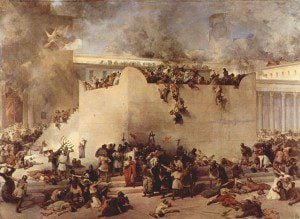I forget precisely, but as I recall it, in one of his novels, perhaps the Journey to the East, Herman Hesse suggests near anything might become our sacred text worthy of deep reading, pointing the way for our wandering hearts. My recollection was that he recommended Don Quixote as a good example.
I’ve noticed some truth in this, although perhaps not for quite “near everything,” although perhaps even Hesse didn’t say that and was more cautious about what might make a real and helpful spiritual text.
Even with the caveat it is interesting what can be worked and pushed and stretched, and reexamined in helpful ways. Particularly if the inquiring eye has been sharpened by hours and days and years pursing the quiet heart…
Looking.
Listening.
Attending to the matter at hand.
At which point it is amazing what becomes sacred writ.
Or might be…
For instance I see in Wikipedia that somebody marks today as the day in the year 70, the 10th of Loios, the 9th or maybe its the 10th of Ab, when Titus unleashed his army and destroyed the Second Temple in Jerusalem. Pretty much what we today speak of as the Fall of Jerusalem.
The destruction of the gate of peace.
The destruction of certainty.
The fall of heaven.
To shift the image just the tinest, within some schools of Buddhism, the dawn of the degeneration, that time when all things fall apart, when things are so fallen that it is impossible to awaken by one’s own effort.
As an aside, this is the age of world religion, where we are now able to and in some ways forced to see correction and guidance and challenge from the deep insights and even on occasion the off hand remarks from others. Buddhism informs Christianity informs science, informs philosophy, informs, well, informs us all. There are no private religions anymore. No way to cut ourselves off from the rest of the world…
The lid is blown off.
The doors to the way are exploded, the way lies open.
And what do we see? Everything collapsed.
Mappo.
And, yes, Dogen, the great Zen sage and theoretical writer, for one, said there is no such age.
I find myself thinking of the fall. Of that time when heaven is lost, and we are cursed, and we, not we, you, me, we must wander and struggle, and hope seems lost.
Mappo.
We’re cast into the great wandering.
You.
Me.
And hope, doesn’t seem able to come from our actions.
Here.
Now.
If so, if we find ourselves cast out in the outer darkness, then what?
After the destruction of the temple then what?
Or…
Or, as someone else asked, after the fifteenth of the month, then what?
That line, the fifteenth of the month, alludes the the full moon, the great image of awakening in Zen Buddhism.
What about collapsing temples and awakening?
Awakening?
What about nothing to hold on to and waking up?
I suggest there’s something juicy here, if we’re willing to baste in it a bit.
Where’s the difference between the wilderness and heaven?
Many of us dream
of waking.
But, the gate, the door, is closed.
It’s closed in my experience, to my observation, by our certainties, by our comfort with what is, whether that what is, is good or ill. We are closed off from our heart’s desire by our sense of our place in the world, whether at the top of the heap or at the bottom or somewhere in between.
The call here is to let the temple fall.
We need that temple to fall.
And then, to walk out into the darkness.
And, then…
Well, who knows?
Hell?
Heaven?
Our own efforts?
Some merciful hand from heaven?
We don’t know.
You don’t know.
I don’t know.
And then…
Well, then its up to you…













